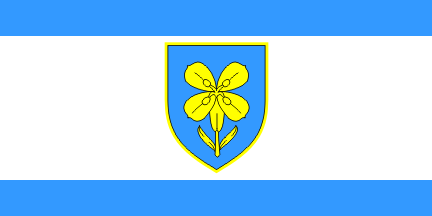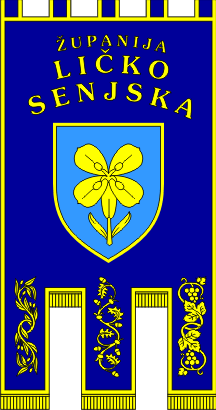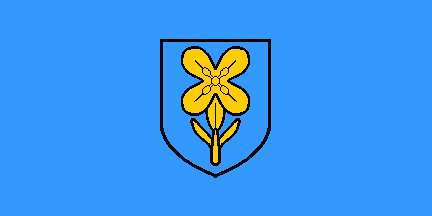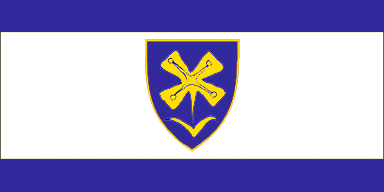
image by Željko Heimer, 21 October 2007

Last modified: 2008-07-05 by dov gutterman
Keywords: lika | senj | county | croatia | licko-senjska | zupanija | gospic | degenia |
Links: FOTW homepage |
search |
disclaimer and copyright |
write us |
mirrors

image by Željko Heimer, 21 October 2007
See also:
Cities:
Communities:
Other Sites:
The County of Lika and Senj (Lic<ko-senjska z<upanija,
number IX. in the official listing) is situated in central and
coastal parts of Croatia, in background of Velebit mountain range
(Lika) and coast called Croatian litoral (as opposite to
Dalmatian coast further south). It is one of the less developed
counties, many parts being in high elevations with little
possibilities for intensive agriculture and with little developed
coast. It also include the northern part of the island of Pag.
However, the county include several national parks and nature
protected areas, most well known being Plitvice lakes and Velebit
mountians. Also, several imortant transit rutes are going through
it. Inner parts of the county were historically parts of Military
Border, the bulwark against Turks, when considerable number of
Serbs inhabited it. After the declaration of independence, the
Serb separatists proclaimed Republic of Serb Krayina in eastern
parts, and held it occupied until 1995 (as the beggining of
uprising are counted the incidents around Plitvice lakes). The
county capital Gospic - one of only few counties whose name dous
not contain the name of its capital.
Željko Heimer, 21 June 1999 and 25 May 2000
There are some interesting things in the numbers of the local
official gazette available on-line at <www.licko-senjska.hr>
(year 2002 and further).
In number 24/02 there is a conclusion permiting the use of the
county coat of arms to the International Heraldic Academy from
Bratislava for use in their Encyclopedia. The conclusion quote
the name of the decision adopting the coat of arms and the flag
as: Odluka o grbu i zastavi Licko-senjske županije,
Županijske glasnik 11/95, 3/00 i 5/00.
Now, we know of the 1995 decision, and presumably the two
references to the year 2000 are minor (or not so minor)
modifications introduced after the Ministry of Administration
suggestion enableing their approval. This would be consistent
with what we know already, now positining the final adoption date
to 2000 (though maybe no changes in design were introduced since
1995).
The number 6/03 include an other decision granting use of county
Coat of Arms in a female basketball club
"Gospic-Industrogradnja" bulletin (so not quite flag
related).
Željko Heimer, 5 September 2003
The symbols were designed by the Heraldic Art d.o.o.
company from Rijeka.
Željko Heimer, 4 November 2007
Below, you can read about two Previously
Reorted Flags of Lika-Senj county of Croatia The two designs
are reported by Mr. J. Ehrlich Zdvorak and me, and are basically
the same regarding the Coat of Arms (apart
from "artistical redention"), while the flags are
different (also the shade of blue). You can also read on some of
mine assumptions regarding the second (Ehrlich's) reported
design. Anyway, I can now provide the rest of the story, if not
its end as yet.
Contacting the County officials, I was told that the flag and Coat of Arms were adopted, but are not currently
in use since the "accordance with the new laws" is
being made. That would be the law "Zakon o izmjenama i
dopunama Zakona o lokalnoj upravi i samoupravi", Narodne
novine 128/99" . However, the flag was adopted in 1995 by
the decision issued in local official gazette:
"Odluka o grbu i zastavi Zupanije Licko-senjske",
22-DEC-1995, Zupanijski glasnik Zupanije Licko-senjske, no.
11/95, pp. 313-5".
The text of the Decision in the Gazette does not include an
image, so the image is still according to description from the
gazette and previously reported image of the coat of arms. The
header of the paper on which I received the answer from the
County also included the coat of arms (that is "not
used"), and that is again in the light blue shade, I decided
to go for light blue, even if the specified colour in the
decision is only called blue (on the other hand, the ceremonial
flag, that I shall mention latter on is specifically called as
"dark blue").
The elements, and their symbolic is already discussed below, so
just to repeat, the coat of arms is blue triangular shield with
golden flower of degenia. (so article 5 of the decision quoted
above) . The flag is white with blue strpes allong upper and
lower edge, and with the coat of arms bordered golden in the
middle. Ratio 1:2. (Article 8)
The Decision prescribes also a Ceremonial Flag
in shape of gonfalon (Article 9), dark blue with golden bordered
coat of arms in the middle, the name of the county inscribed
above and ornament of branches of olive, oak and vine trees in
three tongues at the lower edge. The olive, oak and vine in the
gonfalon are symbols of wellfare and fertility, of power and
wisdom, and of life and imortality respectivly.
The article 21 of the decision prescribes that it comes into
effect on eight day after issue in the official gazette, that
would be an undetermined date in 1995. Obviously, since the
Ministry of Administration refuzed to confirm that flag and coat
of arms (don't know what was reason behind it) they never came
into wide usage. However, since both Janko and me have seen that
flag and coat of arms in use (not to mention it use on the
official writing paper as told above), it was at least partially
in de facto use.
In March 2000 I was informed about "accordance efforts"
being made to the decision, and it may be that until it was
readopted.
I was unable to obtain the image of the ceremonial flag
described, and the description is surely not enough to provide
for an image. Possibly the real ceremonial flag was never made,
indeed (it would, also need redesign since today the official
name is "Licko- senjska zupanija" and not
"Zupanija Licko-senjska" as it was when the decision
was made).
Željko Heimer, 25 May 2000
In 2002 I noticed the flag started to be used hoisted on the
county hall in Gospic. It might have been used even before, but
summer 2002 is my first visit to Gospic for quite some time. The
use of the flag on the county hall would indicate that the
Ministry issued the approval in the mean time, probably.
Željko Heimer, 4 September 2003
The drawing of the Coat of Arms of the County of Lika and Senj
on Heraldic Art site differs in
artistic details from my previous drawing. I was for quite some
time dissatisfied with my drawing (and even Mladen Stanic of
Heraldic Art pointed the errorneous drawing to me) but I was
unable to get a better drawing to start from. However, it seems
that the Coat of Arms based on my drawing (readily available from
the web) spread in use as I have seen those used around.
Hopefully, this shall correct the tendency. (Also, I have seen
several other artistic representations of the flower used around,
as well...).
The coat of arms shown on Heraldic Art site differs most notably
in the shape of the petails, that are ending with an
"outcast" point, while mine previous drawing (and
others) are well rounded. There are other minor
drawing differences.
Željko Heimer, 21 October 2007

image by Željko Heimer, 21 October 2007
The County of Lika-Senj has the ceremonial flag described in
the 1995 decision.
Željko Heimer, 10 July 2004
gs.gif)
image by Željko Heimer, 21 October 2007

image by Željko Heimer, 21 June 1999
The coat of arms of county are: Azure, a degenia flower Or.The
flag is light blue filed with the coat of arms in the middle.
The flower of the spieces Degenia Velebitica is endemic of the
region, very delicate small yellow flower with four petails.of
the flower. The coat of arms is drawn according to the coat of
arms found on the road sign on the road entering the county,
while the flag is based on several sighting of the flag on TV
coverages. I believe that the flag, as presented here was not
approved by Ministry of Adminsitration (due to their rule,
requiering county flag fields to be of two colours).
According to some previous sighting, I'm inclined to believe that
the current coat of arms is simplification of the previous
proposal (probably induced on MA request) wich included the
flower (only 4 petails) and the white circular lace-work
(broidery?) characteristic and famous from Pag island (this
emblem could be seen on www.licko.senjska.com - not availible at
the moment).
It may be that the flag would be changed to fulfill the MA rules,
but inspite of that it is used, as confirmed in several spottings
on TV, by the county in official ceremonies at least from 1996.
It may be interesting to note that the political magazine
"Globus" issued in several of its numbers the coat of
arms of the county that consisted of the blue shield and yellow
4-petailed flower from the emblem mentioned above. This coat of
arms was issued in the list of counties (used in several public
opinion measurements by counties) among the coat of arms of other
counties that were taken from my FAME pages
(including all errors and inacuracies that were there at the
time). Since the one was missing altogether, Globus journalists
"invented" one, but obviously based on some knowlage of
what was used. No need to tell that they refuzed to cooperate
with me on the project, nor they ever reacted on my objection on
using my graphics without quiting the
authorship. But, that is already another story...
Sources:
- photos of the road sign at highway entrance to the County near
Plitvice, taken 30 May 1999, in my collection.
- sightings of the flag on TV on several occasions.
- <www.licko-senjska.com>,
official pages of the County of Lika and Senj, consulted 21 May
1997.
- "Globus" nacionalni tjednik, br. 415, 20-NOV-1998,
Zagreb. pp 18-19.
Željko Heimer, 21 June 1999

image by Janko Ehrlich Zdvorak, 21 June 1999
I think the last posted image of the Licko-Senjska Zupanija is
a wrong one. I saw recently this one.I saw this flag and arms on
TV-news covering their provincial assembly seat about three weeks
ago. Only evidence I have is that "Hrvatska danas"
(Croatia Today) news, where the flag and coat of arms were shown.
I made quick sketch then...
Janko Ehrlich Zdvorak, 21 June 1999
Of course, it is quite possible that recently the new design
was adopted - as indeed I assumed it would happen eventually -
since the design I posted is not quite according to the flag
regualtions - it has to have two coloured field - something that
is "rectified" on the design you posted now.I would
assume that the coat of arms is basically the same one, and what
you have is only another artistic redention (that would make
third one!), but I would not dare to gainsay without better
confirmation then I have now.Anyway, the pure blue field was seen
by me on TV coverage from some event in Licko-senjska county
assembly around 6 mounth ago (more then enough time to adopt a
new - proper design).As I said, my info is from TV news several
months ago... I would hope that the new flag that Janko reported
is adopted. I have a (snail) mail prepaired and addressed to L-S
county that I hope to post tommorow. let's hope I'll get some
anwser. Another thought just crossed my mind while writing this -
The flag of Gospic, that I so on another TV news covering is just
the same BWB "Spanish" flag with Gospic coat of arms in
it (see on my pages a provisional image, since I do not have
exact image of the coat of arms). It might be possible that the
two flags got confuzed. On the other hand, it may be me who
confuzed it (remember that those coverages show flags for just
few seconds as a rule!). However, it may equally imaginable be
that the assembly found that the same patterned flag is just
fine.
Željko Heimer , 22 June 1999
I have bought a book: Csa'ki, Imre: A magyar
kira'lysa'g va'rmegyéinek ci'merei a XVIII-XIX. sza'zadban,
Corvina, Budapest, 1995 , in which are shown (one big coat of
arms in each page!) all the coats of arms of the counties of the
Hungarian part of the Austro-Hungarian Empire in the XVIII. and
XIX. centuries.
The Hungarian "Lika-Krbava va'rmegye" had as coat of
arms a simple shield divided per fess: 1- divided per pal: a-
gules a swan (?) goose (?) argent crowned or with a medal or at
his neck; B- argent an eagle sable, armed and crowned or, tongued
gules; 2- chequered of 24 [6 x 4] gules and argent. This coat of
arms was adopted in 1873.
Pascal Vagnat, 28 June 1998